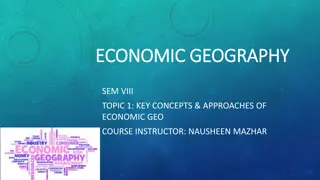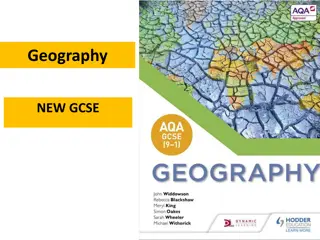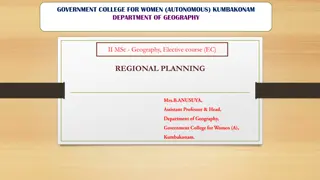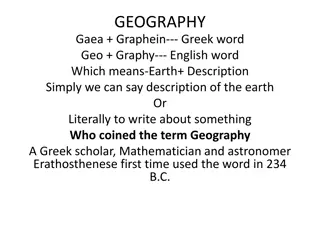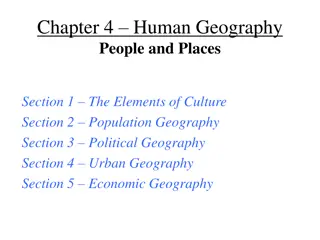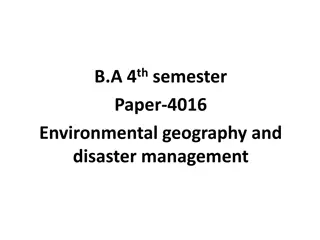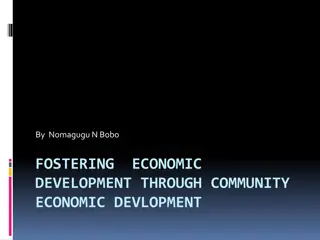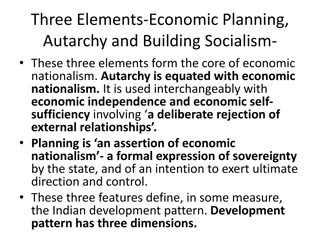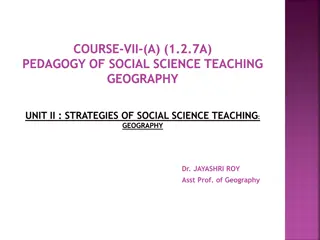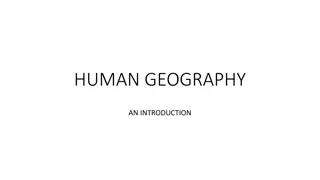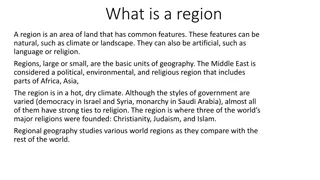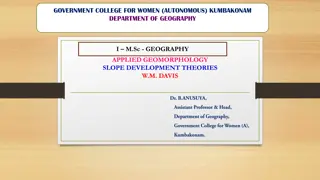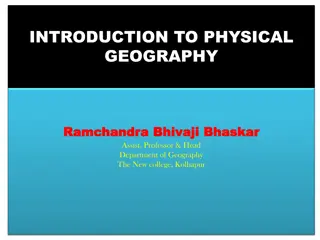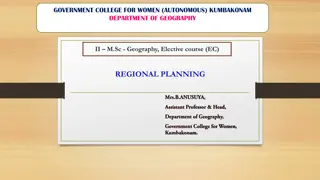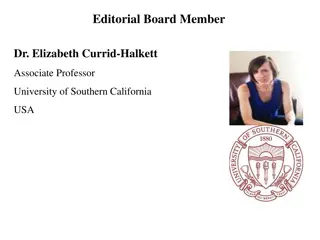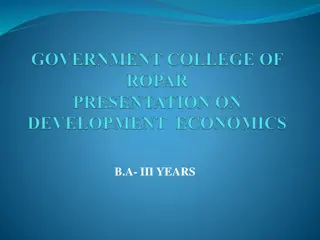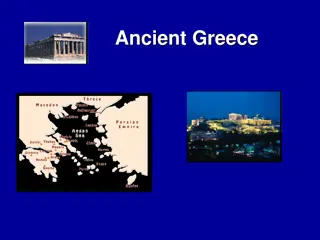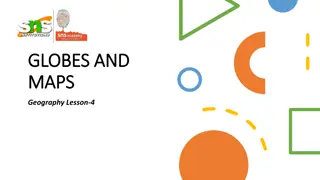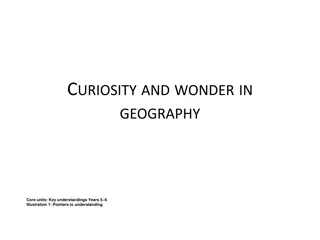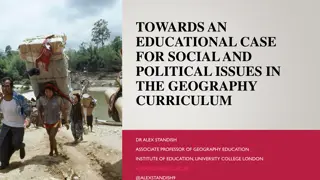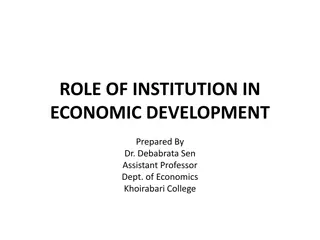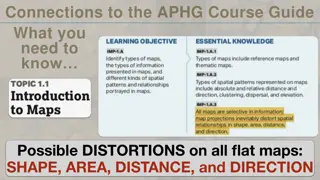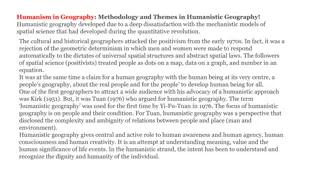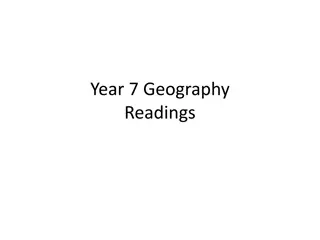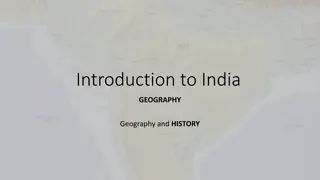Perspectives on Economic Development Through History and Geography
Explore diverse perspectives on economic development through historical and geographical lenses, covering theories from the Renaissance to the Enlightenment, various global approaches, different economic schools, influential institutions and economists, and contemporary issues like finance, feminism, and ecology.
- Economic development
- Historical perspectives
- Geographical approaches
- Economic theories
- Global development
Download Presentation

Please find below an Image/Link to download the presentation.
The content on the website is provided AS IS for your information and personal use only. It may not be sold, licensed, or shared on other websites without obtaining consent from the author. Download presentation by click this link. If you encounter any issues during the download, it is possible that the publisher has removed the file from their server.
E N D
Presentation Transcript
The subject matter is approached from several complementary perspectives. From a historical angle, the Handbook charts the mercantilist and cameralist theories that emerged from the Renaissance and developed further during the Enlightenment. From a geographical angle, it includes chapters on African, Chinese, Indian, and Muslim approaches to economic development. Different schools are also explored and discussed including nineteenth century US development theory, Marxist, Schumpeterian, Latin American structuralism, and regulation theories of development. Institutions. The Handbook has chapters on important events and institutions including The League of Nations, The Havana Charter, and UNCTAD, as well as on particularly influential development economists. Contemporary topics such as the role of finance, feminism, the agrarian issue, and ecology and the environment are also covered in depth.
Contents: 1. Introduction Erik S. Reinert, Rainer Kattel and Jayati Ghosh PART I DEVELOPMENT THINKING ACROSS HISTORY AND GEOGRAPHY 2. Giovanni Botero (1588) and Antonio Serra (1613): Italy and The Birth of Development Economics Erik S. Reinert 3. Economic Emulation and the Politics of International Trade in Early Modern Europe Sophus A. Reinert 4. Cameralism and the German Tradition of Development Economics Erik S. Reinert and Philipp R. R ssner 5. Friedrich List: From Spiritual and Competitive Power to Collaboration Arno Mong Daast l 6. Kathedersozialismus and the German Historical School Wolfgang Drechsler 7. Chinese Development Thinking Ting Xu
8. The Economic Cycle of Imperial China and Its Development Xuan Zhao 9. The Islamic World and Capitalism Ali Kadri 10. Unity and Diversity in the Ottoman School of National Economy: A Reappraisal of Ziya G kalp and Ethem Nejat Ey p zveren, Mehmet Salih Erkek and H seyin Safa nal 11. Development Thinking in India Goddanti Omkarnath 12. Latin American Structuralism: The Co-Evolution of Technology, Structural Change and Economic Growth Mario Cimoli and Gabriel Porcile 13. Revisiting the Debate on National Autonomous Development in Africa Issa G. Shivji 14. Development as the Struggle for Liberation from Hegemonic Structure of Domination and Control Yash Tandon 15. The League of Nations and Alternative Economic Perspectives Carolyn N. Biltoft 16. The Havana Charter: When State and Market Shake Hands Jean-Christophe Graz 17. The UNCTAD System of Political Economy Ricardo Bielschowsky and Antonio Carlos Macedo e Silva
PART II APPROACHES TO UNDERSTANDING DEVELOPMENT 18. Marxist Theory and the Underdeveloped Economies Prabhat Patnaik 19. Economic Development as an Evolutionary Process Richard B. Nelson 20. Classical Development Economists of the Mid-20th Century Rainer Kattel, Jan A. Kregel and Erik S. Reinert 21. Development and R gulation Theory Robert Boyer 22. The Dependency School and its Aftermath: Why Latin America s Critical Thinking Switched from One Type of Absolute Certainties to Another, Gabriel Palma 23. Feminist Approaches to Development Maria Sangrario Floro 24. Reading Freeman when Ladders for Development are Gone Rodrigo Arocena and Judith Sutz 25. Albert O. Hirschman Michele Alacevich 26. Michal Kalecki Jayati Ghosh
PART III ISSUES IN DEVELOPMENT 27. The Agrarian Question and Trajectories of Economic Transformation: A Perspective from Agrarian South Sam Moyo, Praveen Jha and Paris Yeros 28. The Effective Demand Approach to Economic Development Jan A. Kregel 29. Development Planning C.P. Chandrasekhar 30. The Nordic Route to Development Lars Mj set 31. Competitiveness and Development: A Schumpeterian Approach Mehdi Shafaeddin 32. Innovation Systems and Development: History, Theory and Challenges Bengt- ke Lundvall 33. Latecomer Industrialisation John A. Mathews
34. The Developmental State in the Late 20th Century Elizabeth Thurbon and Linda Weiss 35. Development, Ecology and the Environment Edward B. Barbier and Jacob P. Hochard 36. Competition, Competition Policy, Competitiveness, Globalisation and Development Ajit Singh 37. Knowledge Governance: Intellectual Property Management for Development and the Public Interest Leonardo Burlamaqui 38. Legal Structures and Economic Development J rgen G. Backhaus 39. Deindustrialisation and Premature Deindustrialisation Fiona Tregenna 40. The Post-Soviet Industrial Extinctions and the Rise of Jihadi Terrorism in the North Caucasus Georgi Derluguian 41. Epilogue: The Future of Economic Development between Utopias and Dystopias Sylvi Endresen, Ioan Ianos, Erik S. Reinert and Andrea Saltelli Index
A time of ideological shifts. US: The ideological extremes - Trump and Sanders both agree on a) free trade is no longer good for the US b) the US (private) health care model is inefficient (Trump later changed on b). UK: Brexit. The old EU periphery: sinking deeply into debt and getting poorer (Greece, Italy, Spain, Portugal).
An 1848 moment. when the old order collapses because it is attecked from the political right and the political left at the same time. Overly abstract theories collapse. The old elites are under attack from all sides .
The 1848 moment: It often happens that the universal beliefs of one age of mankind a belief from which no one was, nor without an extraordinary effort of genius and courage could at the time be free becomes to a subsequent age so palpable an absurdity, that the only difficulty then is to imagine how such a thing can ever have appeared credible...It looks like one of the crude fancies of childhood, instantly corrected by a word from any grown person. John Stuart Mill, 1848.
The 1848 Generation: three books all from 1848 covering the political spectrum from left to right, all recanting David Ricardo (i.e. creating less abstract theories). Marx & Engels, Communist Manifesto. Marx was so radical he had to flee to England. Bruno Hildebrand, Economics of the Present and the Future. H. was so conservative he fled to Switzerland. John Stuart Mill, Principles of Political Economy. English liberalism recanted on free trade!
The crisis that started in the 3rd World is now reaching the West. Third World 1970s: De-industrialization, falling wages and disappearing middle class in small Latin American countries. Second World 1990s: Massive destruction of industry in former Soviet Block. Wage collapse. First World 2010s: De-industrialization, falling wages, disappearing middle class, Brexit, Trump/Sanders.
Russia: Exchange rate (right axis), real wages and production, 1992-2001 250 Index of Industrial Production, seasonally adjusted, 2000 = 100 200 Index of agricultural production, seasonally adjusted, 2000 = 100 150 Real average monthly accrued wages (based on CPI), seasonally adjusted, 2000 = 100 100 50 Real exchange rate (against US), DEC 95= 100 0
Harold Innis (1894-1952) dynamic taxonomy of knowledge. Science, communicated in Latin , gets more and more abstract, and enters into alliances with the political elites (T. Veblen svested interests). Resistance to the ruling paradigm and the elites builds up among the vernacular (those who do not write Latin) and an overthrow may take place after a shock to the system. Western Civilization is again and again saved by knowledge that for a time only survives in the periphery.
The Cyclical Movements of Economic Theory. School Physiocracy ( Rule of Nature ) Starting point Quesnay 1758 Peak 1760s Death ca. 1789 Classical Economics Ricardo 1817 1840s ca. 1895 Neoclassical Samuelson 1948 synthesis 1990s NOW
Understanding the isomorhism between communism and Western capitalism.


